If you're in search of a canine companion that embodies loyalty and gentleness, then the Greater Swiss Mountain Dog might just be the breed for you. Hailing from Switzerland, this majestic working dog possesses an impressive stature, undeniable strength, and a striking coat that showcases hues of black, white, and rust.
But there's more to this breed than meets the eye. In this discussion, we will explore the adaptability, sensitivity, tolerance, behavior, exercise needs, and overall care of the Greater Swiss Mountain Dog.
Get ready to uncover the secrets of this extraordinary breed and discover why it could be the perfect addition to your life.
Key Takeaways
- The Greater Swiss Mountain Dog is a large working breed originating from Switzerland with a lifespan of 8-11 years.
- They are adaptable to apartment living, but energy levels and space requirements should be considered when choosing a dog for this setting.
- Low-sensitivity dogs are easygoing and tolerant, making them suitable for families with young children or a hectic lifestyle.
- Dogs that tolerate being alone without experiencing anxiety or destructive behavior are better suited for owners with busy schedules.
Origin and Size
The Greater Swiss Mountain Dog, originating from Switzerland, is a large breed known for its impressive size and strength. These dogs have a powerful and muscular build, with males standing at 25.5 to 28.5 inches tall and weighing between 105 to 140 pounds. Females are slightly smaller, measuring 23.5 to 27 inches in height and weighing between 85 to 110 pounds. However, it's important to note that individual dogs can vary in size, being either smaller or larger than the average.
Despite their size, Greater Swiss Mountain Dogs are known for their gentle and friendly nature. They're confident canines with their own ideas, which can make them a bit stubborn at times. Overall, they're excellent watchdogs, but typically not aggressive.
Adaptability and Sensitivity
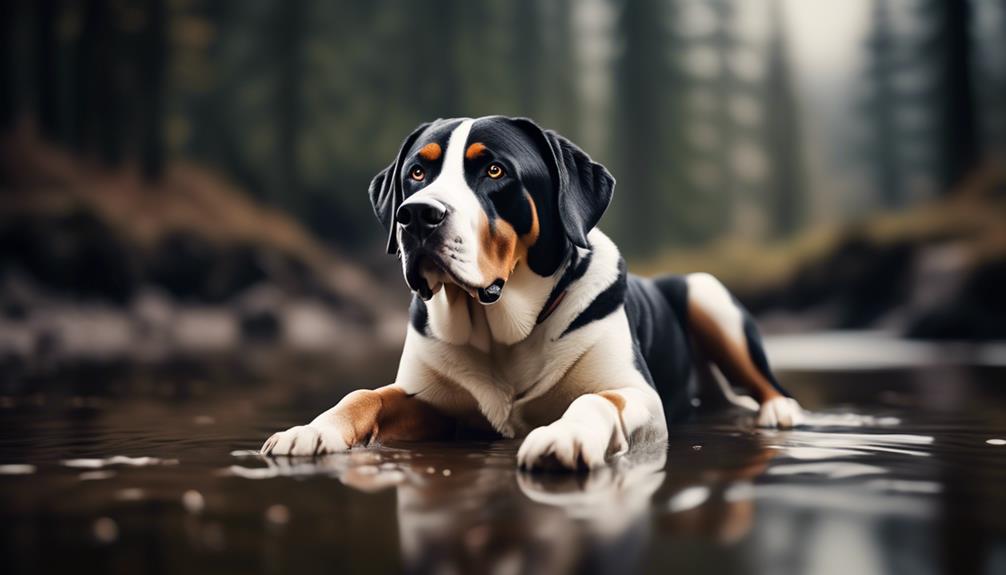
After discussing the origin and size of the Greater Swiss Mountain Dog, let's now explore their adaptability and sensitivity to different living environments.
The Greater Swiss Mountain Dog is known to adapt well to apartment living, making them suitable for those who live in smaller spaces. When choosing a dog for an apartment, it's important to consider factors beyond size alone. Energy levels and space requirements should also be taken into account.
The Greater Swiss Mountain Dog is considered a low-sensitivity breed, meaning they're easygoing and tolerant. They can handle a noisy and chaotic household, making them suitable for families with young children or a hectic lifestyle. Additionally, they're good for novice owners who may be less experienced in dog ownership.
Tolerance and Behavior
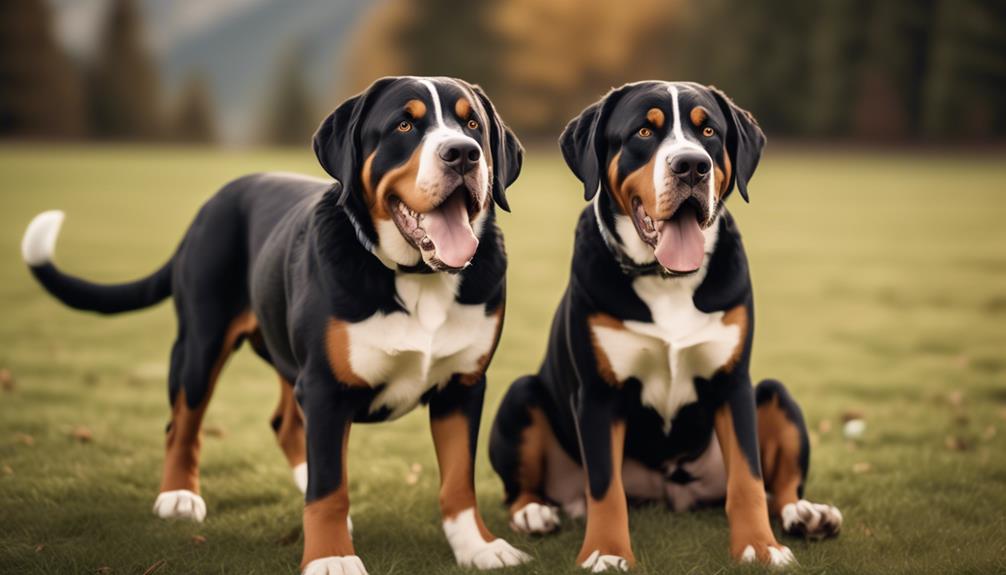
When considering the tolerance and behavior of the Greater Swiss Mountain Dog, it's important to understand how certain breeds bond closely with their families and may struggle with being left alone. This breed is known for its strong attachment to its human family and can become anxious when left alone for long periods of time.
To better understand their behavior, here are three key points to keep in mind:
- Anxious dogs can exhibit destructive behavior when left alone, so it's crucial to provide them with proper mental stimulation and companionship.
- Dogs that tolerate being alone are better suited for owners who work or have busy schedules, as they can handle being left alone without experiencing anxiety or panic.
- Aggression in dogs can be rooted in fear and anxiety. It's important to observe and understand the underlying emotions driving their behavior rather than focusing solely on the aggression itself.
Exercise and Playfulness
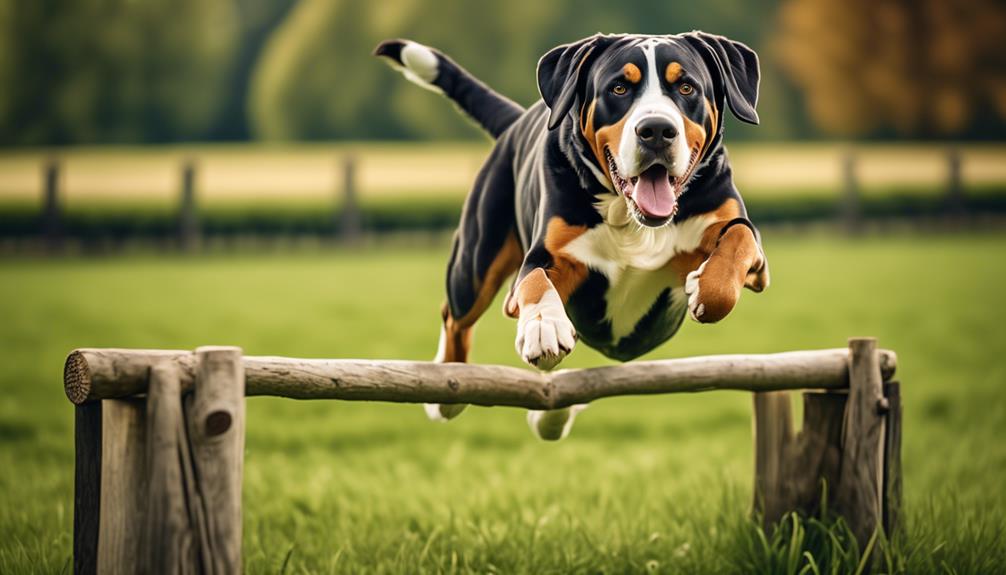
One important aspect to consider when it comes to the exercise and playfulness of the Greater Swiss Mountain Dog is their energy level, which varies among different dog breeds. This breed falls into the category of high-energy dogs, requiring significant exercise and mental stimulation.
They thrive on physical activities such as long walks, hikes, and playtime in a securely fenced yard. Their strong working heritage makes them well-suited for activities like obedience training, agility, and even cart pulling.
It's important to match their exercise needs with your own activity level and lifestyle. If you lead a less active lifestyle, a dog with lower energy levels may be a better fit. However, if you enjoy an active lifestyle and can provide ample playtime, this playful and energetic breed will make a delightful companion.
History and Popularity
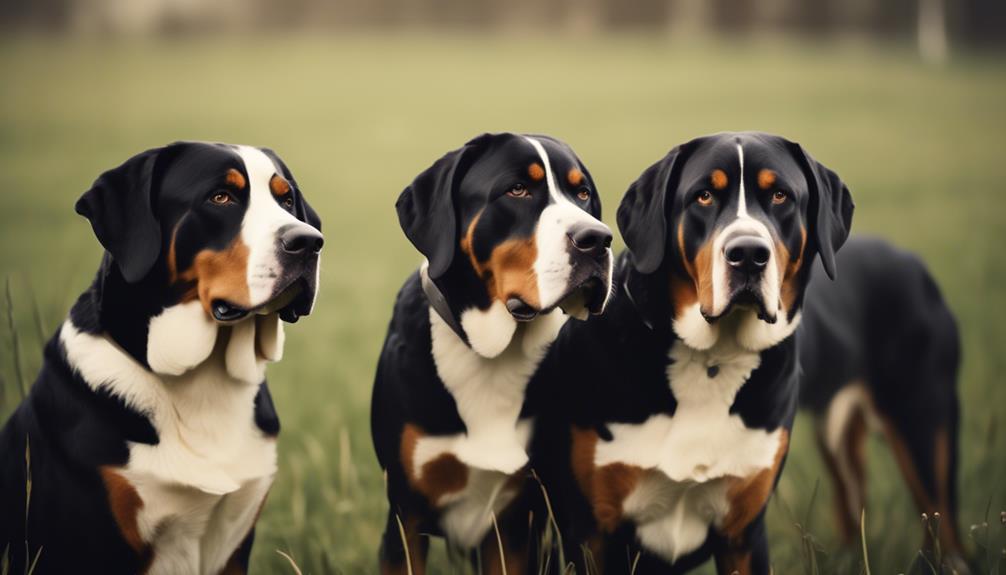
The Greater Swiss Mountain Dog, one of Switzerland's oldest dog breeds, has a fascinating history and gained popularity slowly over time.
- Originating from large, Mastiff-like dogs brought by Roman Legions, they served as herding, guard, and draft dogs.
- Although once a popular breed in Switzerland, their numbers declined in the 1900s.
- However, they were recognized as a separate breed in 1909 and have since gained popularity, albeit gradually.
The Greater Swiss Mountain Dog is a majestic breed with a rich heritage. Their history as versatile working dogs and their distinctive appearance have contributed to their appeal. Despite their slow rise in popularity, they've garnered a dedicated following of enthusiasts who appreciate their gentle, alert, and fun-loving nature.
Personality and Temperament
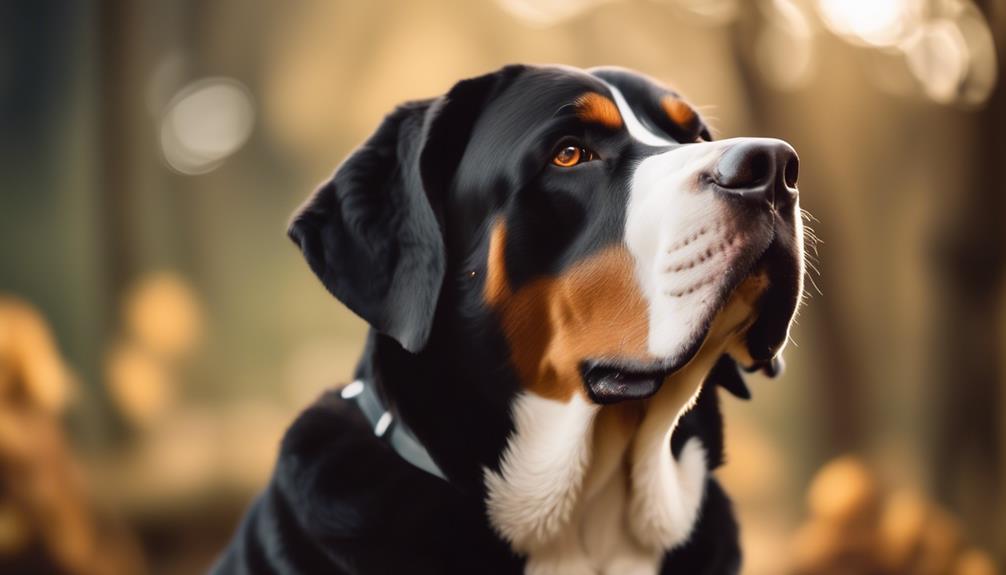
The Greater Swiss Mountain Dog is known for its gentle, alert, and fun-loving personality, making it a delightful companion for those who appreciate their unique temperament. These confident canines have their own ideas and can be stubborn at times. They make good watchdogs but are typically not aggressive. The temperament of the Greater Swiss Mountain Dog is affected by heredity, training, and socialization. They are generally healthy, but can be prone to certain conditions such as hip dysplasia, elbow dysplasia, OCD, patellar luxation, and gastric torsion. Regular veterinary care and early detection are important for maintaining their health. Early socialization is crucial for a well-rounded dog, and proper exercise, mental stimulation, and grooming are essential for their well-being.
| Personality Traits | Temperament |
|---|---|
| Gentle | Confident |
| Alert | Stubborn |
| Fun-loving | Watchful |
Health and Care
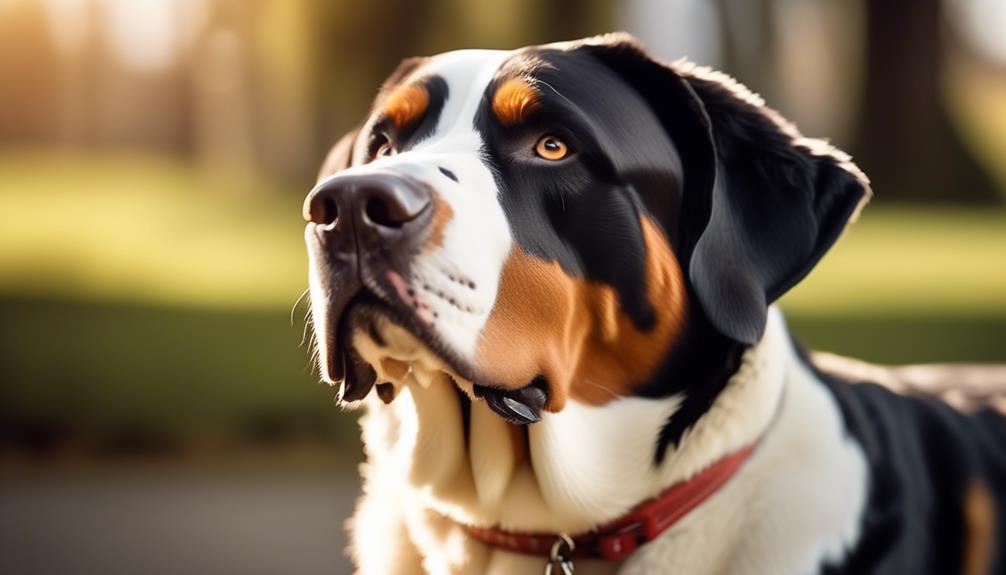
Moving on to the important aspect of the Greater Swiss Mountain Dog's well-being, let's now focus on their health and the care they require.
When it comes to the health of these dogs, there are a few key considerations to keep in mind:
- Regular veterinary care is crucial for maintaining their overall health and detecting any potential issues early on. Make sure to schedule regular check-ups and vaccinations.
- Proper nutrition is essential for the Greater Swiss Mountain Dog's well-being. Provide them with a balanced diet that's appropriate for their age, size, and activity level.
- Exercise is important to keep these dogs physically and mentally stimulated. They're a working breed and require regular exercise to prevent obesity and maintain good muscle tone.
In terms of care, grooming is necessary to keep their short and dense coat in good condition. Regular brushing and nail trimming are recommended.
Socialization and Grooming
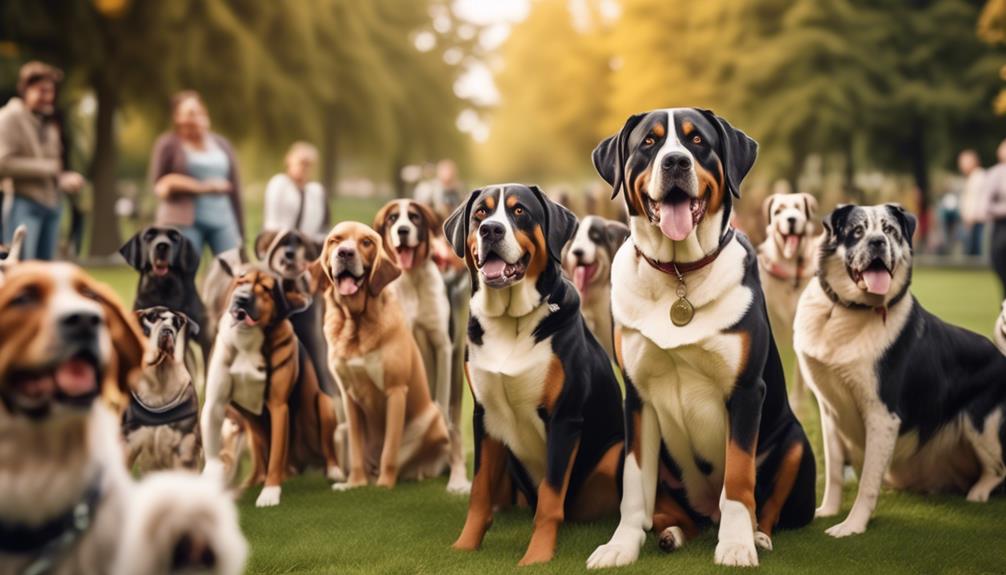
To ensure the well-rounded development of your Greater Swiss Mountain Dog, it's crucial to focus on their socialization and grooming needs.
Socialization plays a vital role in shaping their behavior and temperament. Enrolling your dog in puppy kindergarten and exposing them to various experiences will help them become well-adjusted and confident. Regularly inviting visitors to your home and taking your dog to busy places will also polish their social skills.
Additionally, grooming is an essential part of caring for your Greater Swiss Mountain Dog. Their short and dense coat requires regular brushing to remove loose hair and prevent matting. Nail trimming is necessary to keep their paws healthy and prevent discomfort.
Frequently Asked Questions
Are Greater Swiss Mountain Dogs Good With Children?
Yes, Greater Swiss Mountain Dogs are generally good with children. They have a gentle and fun-loving nature, making them suitable companions for kids. However, as with any dog, proper socialization and supervision are crucial to ensure a safe and harmonious relationship.
Do Greater Swiss Mountain Dogs Require a Lot of Grooming?
No, they do not require a lot of grooming. They have a short and dense coat, which is easy to maintain. Regular brushing and nail trimming should suffice to keep them looking neat and tidy.
Are Greater Swiss Mountain Dogs Prone to Separation Anxiety?
Yes, Greater Swiss Mountain Dogs can be prone to separation anxiety. It is important to provide them with proper training, socialization, and mental stimulation to help alleviate this issue and ensure their well-being.
How Much Exercise Do Greater Swiss Mountain Dogs Need?
Greater Swiss Mountain Dogs require a moderate amount of exercise. They benefit from daily walks, playtime, and mental stimulation. Regular exercise helps keep them physically and mentally healthy, preventing behavioral issues and promoting overall well-being.
What Are Some Common Health Issues in Greater Swiss Mountain Dogs?
Common health issues in Greater Swiss Mountain Dogs include hip dysplasia, elbow dysplasia, OCD, patellar luxation, and gastric torsion. Other conditions like splenic torsion, cataracts, distichiasis, entropion, and panosteitis can also occur. Regular veterinary care and early detection are crucial.
What are the similarities and differences between the Greater Swiss Mountain Dog and the Northern Inuit Dog?
The Greater Swiss Mountain Dog and the Northern Inuit Dog breed both share certain similarities, such as their large size and strong build. However, the Northern Inuit dog breed has a more wolf-like appearance compared to the Greater Swiss Mountain Dog. Additionally, the Greater Swiss Mountain Dog is known for its distinctive tricolor coat, while the Northern Inuit dog breed can have a wider range of coat colors.
Conclusion
As you conclude your exploration of the Greater Swiss Mountain Dog, you can't help but be captivated by their symbolism.
Like the towering Swiss Alps from which they hail, these loyal and gentle companions stand tall in their strength and beauty.
Their adaptability and low-sensitivity nature make them a perfect fit for a variety of living situations, while their playful and tolerant behavior makes them an ideal choice for families.
With proper care and socialization, the Greater Swiss Mountain Dog will be a steadfast and majestic addition to your family.




